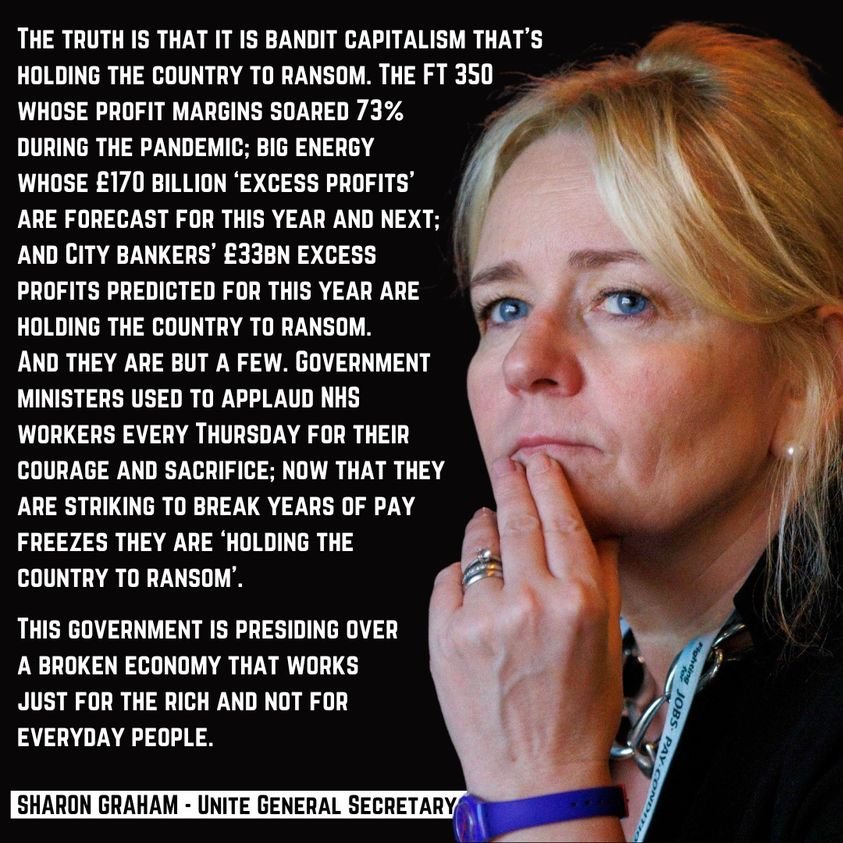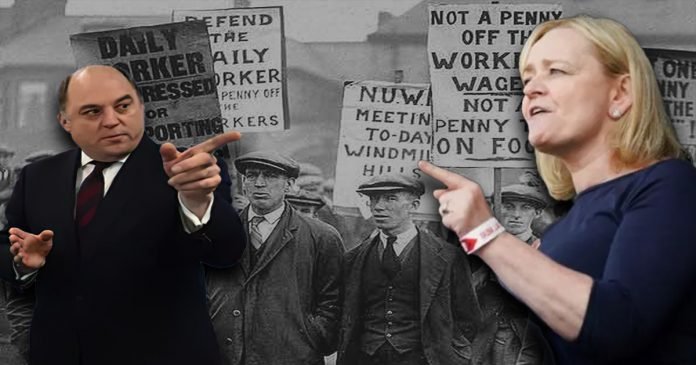Ben Wallace rants, We’re not going back to the 1970s
Unite the union responded to Ben Wallace’s comments on public sector pay disputes after Wallace went off on some poor imitation of an Alf Garnet rant about Trade unions seeking to hold the government “to ransom” by demanding direct talks on public sector pay.
After speaking at Manchester airport, where he met military personnel covering for Border Force staff, the defence secretary rejected a charge from the new TUC general secretary, Paul Nowak, that the government was sabotaging efforts to end the strikes.
Wallace rejected Nowak’s call for ministers to join talks, saying they could not override the recommendations of government-appointment pay review bodies, and that unions should instead talk to employers.
“We’re not going back to the 1970s where the trade union barons thought that they ran the government,” Wallace said. “They used to meet in Downing Street and tell the Labour government of the day what they’re going to do. We’re not going to go back to that. We’re not going to be held to ransom.
“The trade unions can negotiate, they can negotiate with their employers and try and come to a resolution. That’s the most important thing. There’s no magic wand here to come up with money that the country doesn’t have.
“Ultimately we’re in a position where we’re trying to listen to the independent advice, through the independent pay bodies, offer a settlement to the workforces and then try and bring that to a resolution. But if the trade union leadership think we’re all just going to ignore these independent bodies to suit their agenda then they’ll be mistaken.”
Ministers have refused to negotiate
Ministers have refused to negotiate on pay, saying they must follow the official recommendations.
But the TUC leader, Paul Nowak, has said the pay review bodies were “in danger of being brought into disrepute”.
Speaking to the BBC’s Today programme this Thursday morning, he said: “The government is hiding behind the pay review bodies, refusing to negotiate on pay and refusing to reach a reasonable settlement with our public sector unions.”
Despite the intense debate, the committees whose members decide the incomes of millions of workers are not high-profile. So who sits on them, and how accountable are they?
Members of the pay review boards are not allowed to discuss their work and their voting records are kept under wraps. Their conclusions are agreed “collectively”, and there is little interrogation by parliament.
Unions have complained they can only make submissions to pay review bodies. Unlike the Low Pay Commission, which sets the level of the minimum wage and counts senior TUC official Kate Bell among its nine commissioners, unions are excluded from having representatives on the pay bodies themselves.
House of Commons select committees have no opportunity to quiz nominated members about their qualifications before they are appointed by the prime minister, as they can with Bank of England policymakers.
There is one former trade union official on the NHS pay review body (NHSPRB), Stephanie Marston. She previously worked for the Prospect union, which covers 100,000 professional workers in the civil service and private sector.
A spokesperson for Prospect said it had no contact with Marston, who quit her union job in 2017.
So are pay review bodies independent or linked to the government?
.@MishalHusain rightly points out to @SteveBarclay that the pay review body process is far from 'independent', a string of pay recommendations past and present have not been accepted by Govt.
— Paul Waugh (@paulwaugh) December 21, 2022
The pay review bodies are appointed by ministers, but claim to still be independent.
Even so, they have to work to the government’s parameters.
The government says what pay award it is aiming for, determines when it will respond to and publish reports of pay review bodies – and is always aiming for the 2% inflation target meant to keep the economy on an even keel.
They are therefore unlikely to recommend something which ministers will only reject.
So it’s not surprising that Pat Cullen, general secretary of the Royal College of Nursing union, claimed that the NHS pay review body is “set up by government, paid by the government, appointed by government, and the parameters of the review are set by government.”
She added: “There’s nothing independent about the independent pay review body.”
Unite responds to Ben Wallace comments on public sector pay disputes

Responding to defence minister Ben Wallace’s attack on the trade unions, Sharon Graham Unite general secretary said:
“This government is spinning a web of lies to divert the blame for who is really responsible for the economic crisis engulfing the country. The unions ‘holding the country to ransom’ is another to add to their long list.
“Ben Wallace’s comments are puerile. The truth is that it is bandit capitalism that’s holding the country to ransom. The FT 350 whose profit margins soared 73 per cent during the pandemic; big energy whose £170 billion ’‘excess profits’ are forecast for this year and next; and City bankers’ £33bn excess profits predicted for this year are holding the country to ransom. And they are but a few.
“Government ministers used to applaud NHS workers every Thursday for their courage and sacrifice; now that they are striking to break years of pay freezes they are ‘holding the country to ransom’. This government is presiding over a broken economy that works just for the rich and not for everyday people.”
Support Independent Journalism Today
Our unwavering dedication is to provide you with unbiased news, diverse perspectives, and insightful opinions. We're on a mission to ensure that those in positions of power are held accountable for their actions, but we can't do it alone. Labour Heartlands is primarily funded by me, Paul Knaggs, and by the generous contributions of readers like you. Your donations keep us going and help us uphold the principles of independent journalism. Join us in our quest for truth, transparency, and accountability – donate today and be a part of our mission!
Like everyone else, we're facing challenges, and we need your help to stay online and continue providing crucial journalism. Every contribution, no matter how small, goes a long way in helping us thrive. By becoming one of our donors, you become a vital part of our mission to uncover the truth and uphold the values of democracy.
While we maintain our independence from political affiliations, we stand united against corruption, injustice, and the erosion of free speech, truth, and democracy. We believe in the power of accurate information in a democracy, and we consider facts non-negotiable.
Your support, no matter the amount, can make a significant impact. Together, we can make a difference and continue our journey toward a more informed and just society.
Thank you for supporting Labour Heartlands












